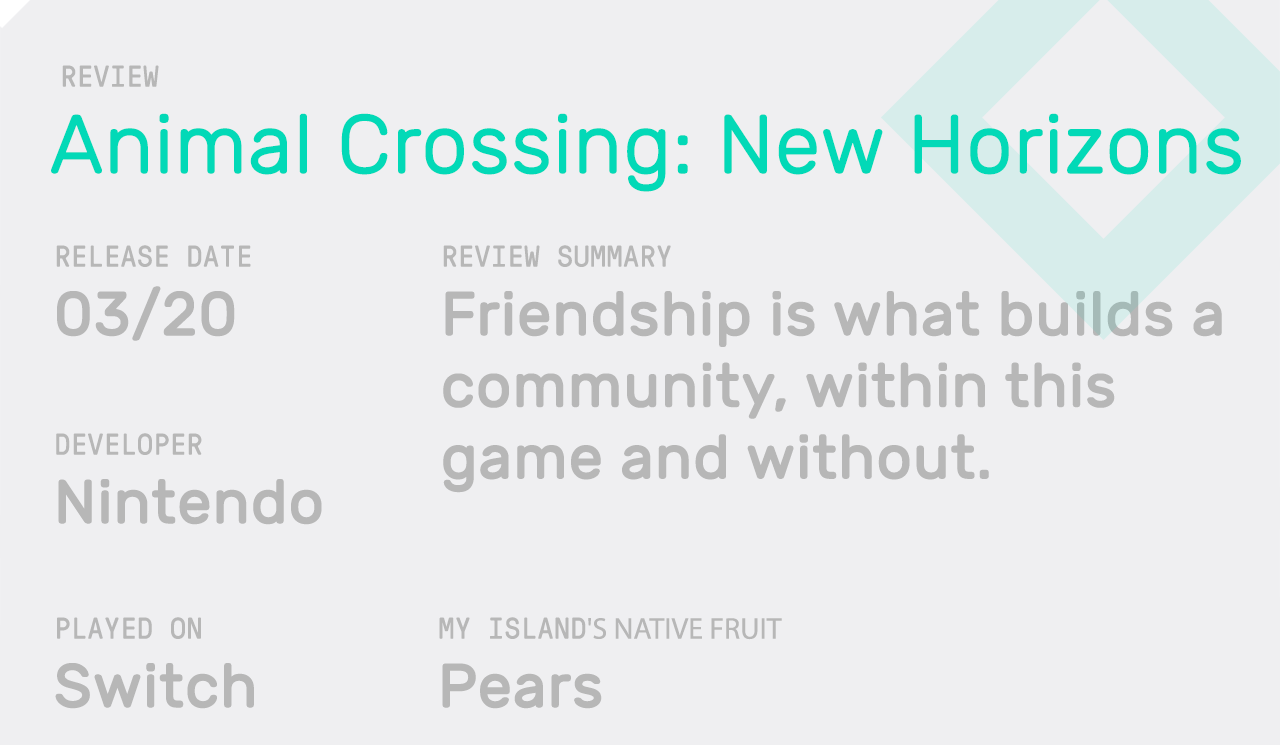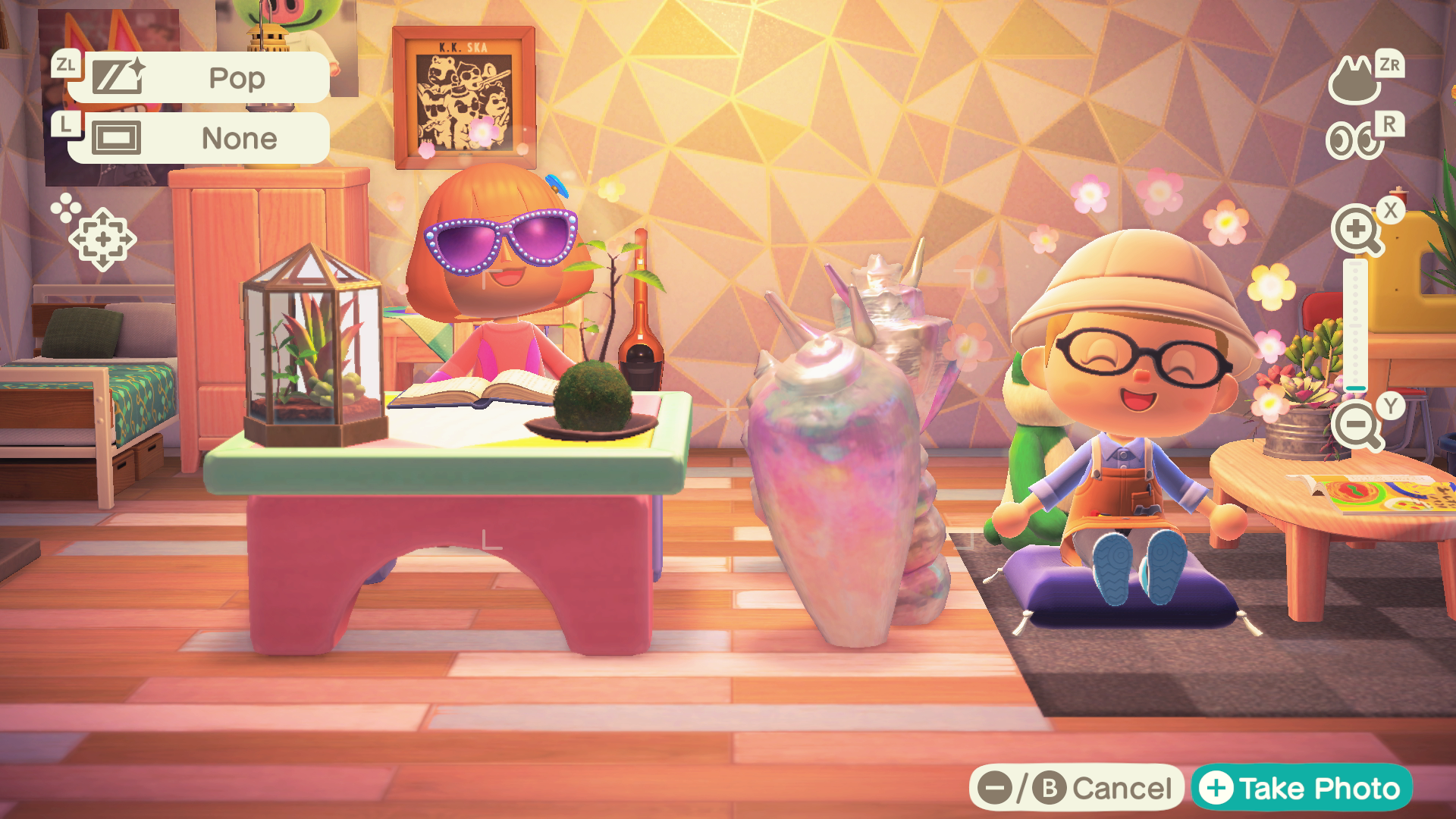When I first arrived on Ella, a deserted island I named after my cat, it rained for a week. My boyfriend was irritated as I hunted snails and went fishing, trying to reap the meager bounties the island had to offer. "Is it still raining?" he'd ask me, watching me standing with my fishing pole in the water, raindrops bouncing off my head. It was almost as if he was mad at the island for being gloomy while I was there. "It was sunny this morning!" I'd say. I'm not sure he ever really believed it.
When Ella's skies opened up from behind the veil of clouds, her beauty was sometimes overwhelming. Ella, my island in Animal Crossing: New Horizons, is a tiny piece of paradise, in a time when I need the idea of paradise very badly.
Games that share some DNA with Animal Crossing: New Horizons are often preoccupied with the obtaining and hoarding of resources in a way previous entries in the Animal Crossing series haven't been. There can be an oiliness to Minecraft when you think about exactly how radically you alter the world. A game like Satisfactory doesn't even pretend to have a pleasant facade, and casts you in the role of an employee of a heartless capitalist corporation intent on stripping the resources from a planet. Those two games are about control, and in a way New Horizons is too. But as much control as you have over your island—it is a lot, especially compared to other Animal Crossing games—what stands out about New Horizons are the ways it makes you accept your lack of control.
More than anything, Animal Crossing: New Horizons asks the player what makes a society.
Animal Crossing: New Horizons is basically a fantasy of harmless colonialism, one where all the rough edges have been sanded off to make room for talking animals, pastel furniture, and catching bugs. Tom Nook has started a new "Deserted Island Getaway" travel package and you, along with two other animal villagers, take him up on it. After choosing between four maps, I landed on a completely unoccupied island alongside a kangaroo named Sylvia and a pig named Cobb. It would become Ella, my new home.
More than anything, Animal Crossing: New Horizons asks the player what makes a society. Each and every action you take to develop your island is an exercise in community building. Several characters in the game will tell you that what makes your island special is your presence, your outreach to your neighbors, your kindness. It's as much a game about community organizing as it is about claiming new lands.
But, let's be clear, it's also about claiming new lands and stripping them for resources in the pursuit of consumer goods, and leaving them destroyed and forgotten in your wake.
I may not be displacing a native people or anything like that, but it's still hard to wash off the politics of the frontier when I play. The idea of finding "unoccupied" land and taming it, turning it into an urban society, is so entangled with colonialism that it is impossible to unravel that knot. But the analogy to real-world, extractive colonialism gets much more pointed when it comes to New Horizons' two new mechanics: Nook Miles and crafting.
Nook Miles are a new currency you earn just for doing the stuff you'd normally do throughout your day. In order to upgrade from a tent to an actual home, you'll pay off your first loan in Nook Miles. I mainly earned mine through chopping trees, smacking rocks with a shovel to gather stone, iron and clay, and selling bundles of weeds—I paid off the loan in a day.
Sometimes in order to craft something you want for your house, you'll need more resources than your island can offer. To that end, you can buy a ticket to a random island using your Nook Miles, appropriately called a "Nook Miles Ticket." Nook Miles can be exchanged for other useful game items like crafting recipes, as well as some cosmetic goods. As the Dodo working the counter at the small airport on your island will tell you, Nook Miles Tickets will take you to a random island that you've never seen before and will never see again. You're essentially given a carte blanche to wreck the place.
Using a Nook Miles Ticket to gather enough resources to say, build a few wooden tables, is the first time that Animal Crossing has felt violent to me. Because the Nook Miles ticket islands are essentially disposable—you're not going to face any repercussions from destroying all the rocks and cutting down all the trees—I would just go to these islands and demolish them. It felt purely mercenary; it became something I would do as I watched reality television, which is how I handle the boredom of most other chores. I would pick every flower, chop every tree, hit every rock, collect every bug and fish. Devastation laid in my wake. It was like a cutesy cartoon version of what happened as European explorers ventured out into Asia, Africa and the Americas. They took everything.

Still, you need those resources for the best part of New Horizons, which is building a community. As my town developed, three more villagers moved to Ella: a squirrel named Filbert, a giraffe named Savannah and my favorite, a cat named Tabby who loves to tell me how great I look all the time. In order to get ready for their arrival, I had to build three pieces of furniture for the inside of their house, and three for the outside. Through judicious use of Nook Miles Tickets, I was able to craft all eighteen pieces of furniture in one day. The next day, when Tom Nook said that we would be getting just one new villager, I realized that Filbert, Savannah and Tabby would be coming one at a time, and that in the intervening three days I wouldn't have any immediate goals. I would have to stop playing or make my own fun. Most of the time I chose to stop playing, feeling like the game had given me permission to let it go for the night.
In order to play games for review, you have to sprint, even if that game is Animal Crossing, which is paced more like a leisurely stroll. For the kinds of players who approach this game and find themselves at a loss for what to do, fear not: those Nook Miles are essentially an endless checklist of tasks that can guide your play in a more direct way than past games have. It's a little easier to fish out every single aquatic creature in your rivers, pond and ocean if you know there's five hundred Nook Miles waiting for you on the other side. Still, no matter how quickly you complete each milestone, there will be a point where the game tells you that it just doesn't have any more work for you. "Log off," the game all but says to you.
When a game lets you do anything, I always get analysis paralysis. If there are too many options I freeze up, too anxious about what I'm missing out on if I make my choice too hastily. The delights of Animal Crossing as a series are so self directed that it has never really given me that anxiety. I feel like New Horizons has finally illuminated for me why this is so, and it comes down to how much of this game is intended to make the player feel warm, comforted and safe.
I'm not a god in Animal Crossing, like I am in something like Dwarf Fortress. I'm just another person on this island, trying to make life pleasant for everyone.
Take the Museum, for instance. What starts off as a tent where series veteran Blathers the owl sits becomes a truly gorgeous display of everything you've collected. My favorite area in this museum is a small greenhouse with a fountain that's filled with butterflies. I have taken so many screenshots of my Animal Crossing: New Horizons character just sitting among the butterflies. I have had to delete other screenshots from my Switch—at least two hundred of them—because I wanted to take more screenshots of my character sitting in that butterfly sanctuary, or fishing on the pier, or sitting in my immaculately decorated room. There is a gentleness to these places that I can't find in the world during the time of COVID-19. I'm looking forward to spending even more time in those calming spaces, but with my friends, once they have their copies of New Horizons and online play is functional.
Even though New Horizons gives you all this control over the land and the layout of your island, letting you choose where shops will be located, where to build bridges, and who lives where, in practice it is more about the other little animals who live there, who bring your island to life. Cobb, who was my favorite villager until Tabby came along, can often be found reading a book underneath a tree. I've returned two lost items to him so far, and he has given me some rad clothes in return. The act of writing letters and doing favors for villagers in Animal Crossing has been my favorite since the GameCube version of the game, and that's still present here. In fact, you'll earn Nook Miles for making close friends with villagers, via a metric that is obscured from the player. It makes sense, I suppose. Why would I have access to the interior of Cobb's mind? I'm not a god in Animal Crossing, like I am in something like Dwarf Fortress. I'm just another person on this island, trying to make life pleasant for everyone.

I try to play New Horizons shortly after I wake up and after work, before the shops close at nine. Starting the day with an announcement from Isabelle, who just arrived and is taking over the morning announcement duties from Nook, is a nice way to set the pace for what I'll do in the game each day. When a new villager comes, I know to greet them. If a new building has been built, I know that I should go to Resident Services and ask Tom Nook to hold a ceremony to commemorate it. There's a simplicity to life on Ella that I cherish, especially as life becomes so uncertain and stressful in the wake of COVID-19 and the Democratic presidential primary.
Two weeks ago I went canvassing for the Sanders campaign. Most of the people in the building I canvassed weren't home, and most of those that were did not speak English. The few people that were open to speaking with me and my friend were all warm, personable and friendly. A few invited us inside for water. One was a 99 year old socialist who told us she was a delegate for Walter Mondale in the Democratic National Convention in 1980. Another got into Sanders through her daughter, who encouraged her to buy a huge banner for their balcony. It's been a contentious primary, and online it's often felt toxic, but talking to people at their homes, that unpleasantness melted away. It was warm and affirming, and that is what Animal Crossing achieves at its best. New Horizons is asking you to create a society from scratch, to build a community out of a deserted island, but making a community isn't dependent on how many trees you cut or weeds you pull. Community in New Horizons is built in the same ways it is built in the real world: by talking to your neighbors, and listening to them in return.
from VICE https://ift.tt/2WdEL2B
via cheap web hosting
No comments:
Post a Comment